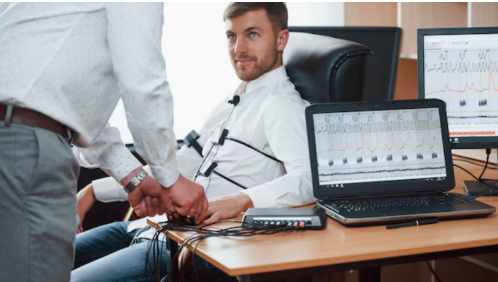Being wrongfully accused of a crime can put your reputation or entire life on the line. Depending on the nature of the accusations, you could be looking at hefty fines, a lengthy jail term, or both.
Fortunately, taking a polygraph exam might help establish your innocence and exonerate you from criminal responsibility.
Results from lie detector tests can tilt the scales in your favor, even when every other piece of evidence points to your culpability.
Read below as we unpack the role of polygraph testing in criminal defense.

The Role of Polygraph Tests in Criminal Defense
1. Seeking Dismissal
Litigating criminal cases can be a long-drawn process. In jurisdictions where the wheels of justice turn painfully slow, even misdemeanors might take years to determine.
Protracted legal battles could result in untold mental anguish and financial losses to the defendant. Therefore, it’s better to seek dismissal as soon as possible.
Your attorney may recommend a polygraph test to get a case dismissed so you can resume your normal life. Pleas for dismissal are best lodged earlier in criminal proceedings, preferably during the pretrial phase.
2. Corroborating Earlier Submissions
Prosecutors are incredibly smart individuals trained to challenge every legal theory put to them. As such, they’re difficult to convince at the first attempt.
If a prosecutor continues to cast doubts on your innocence despite submitting to a polygraph exam, your attorney may recommend taking subsequent lie detector tests. The idea is to establish a consistent pattern in your physiological reactions, which is critical in determining innocence.
To convince a prosecutor, it’s best to have subsequent lie detector tests performed by their preferred polygrapher. However, insist on an experienced polygraph examiner. This helps improve the accuracy and credibility of the test results.
3. Seeking a Plea Bargain
Lie detector tests rely on spontaneous physiological responses, making them extremely difficult to manipulate. If you’re guilty as charged, failing a polygraph exam is expected. But it’s not the end of the world.
Your criminal defense lawyer may use polygraph results to seek a bargain plea and prevent you from receiving a harsher sentence. This is particularly important for cases that involve multiple defendants.
While failing a lie detector test may confirm criminal culpability, it provides a golden opportunity to plead guilty or no contest in exchange for reasonable concessions from the prosecution.

Testing Defendants and Plaintiffs
In seeking exoneration from criminal responsibility, defense attorneys may recommend polygraph tests to defendants and plaintiffs.
Remember that in criminal proceedings, the burden of proof rests with the accuser rather than the accused. Getting petitioners to submit to polygraph tests is an ingenious cross-examination strategy, as their responses must be congruent with their accusations.
In certain instances, lie detector tests may also be administered to other parties to the case, including witnesses and family members.
Are Polygraph Tests Admissible?
The admissibility of lie detector tests is somewhat nuanced. Less than half of US states allow criminal defense attorneys to adduce polygraph results as evidence in court.
Therefore, it’s essential to research the legal admissibility of lie detector tests in your jurisdiction before submitting them.
Even in states where polygraphs are admissible in court, the defendant must unequivocally submit to getting evaluated. Be sure to read the fine print before signing off on the test.
Lastly, the admissibility of polygraph tests depends on the polygrapher. Your attorney must ensure a professionally trained examiner administers the test.

What If I Fail A Polygraph Test?
Taking a polygraph exam is a stressful experience, which explains why lie detector tests have their limits. Intense anxiety, the wrong diet, and uncomfortable clothing may all lead to false positives.
Besides, you could fail a polygraph exam if you’re uncomfortable with the subject. A case in point is when you witnessed a murder first-hand and are trying to block the memories rather than recollect them.
Fortunately, your attorney may use results from a failed polygraph test to seek a plea bargain. It’s also exciting to know that lie detector results are merely used to corroborate other submissions rather than as evidence in themselves.
However, since you cannot reject the results of a polygraph that you willfully consented to, it’s better to avoid the test altogether if you’re not psychologically ready for it.

Establish Your Innocence with a Professionally Administered Polygraph
The role of polygraph examinations in exonerating defendants from criminal responsibility cannot be overstated. However, the accuracy of lie detector tests relies heavily on who administers them.
To accord a polygraph evaluation the credibility it deserves, the test must be performed by a duly credentialed examiner.
Select a polygraph examiner who has undergone professional training in a recommended polygraph school. The individual should also possess valid licenses issued in their respective jurisdictions of practice. Besides, they must have racked up impressive ratings from their previous clients.






